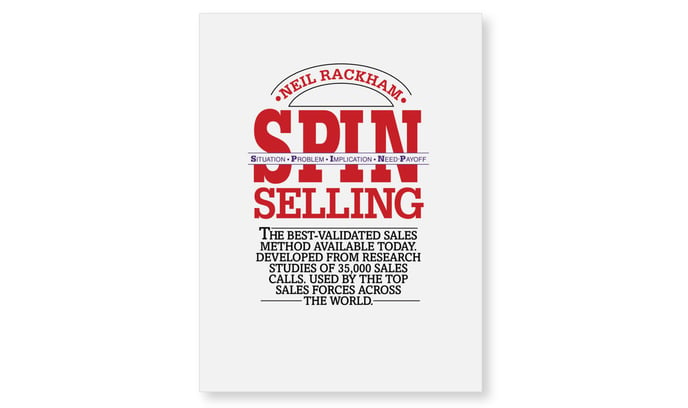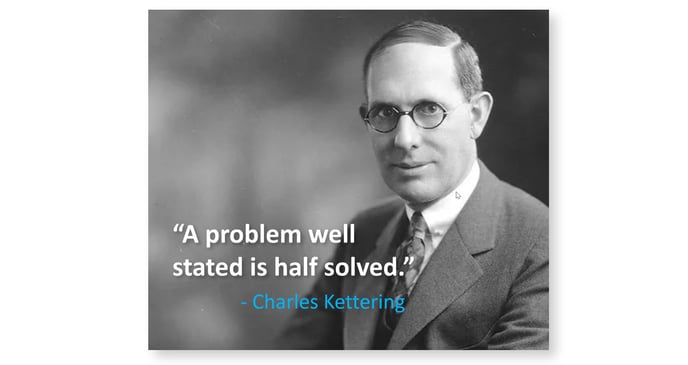2. Benefit #1: Greater selling effectiveness
When sales professionals use strong Everyday VOC probing, their customers are more likely to buy from them.
You’re probably familiar with consultative selling, also known as needs-based selling. It’s based on first understanding the customer’s needs or pain points, and then seeking solutions. It was introduced in the 1970's, and given a strong boost with the 1988 publication of SPIN Selling by Neil Rackham.
The researchers monitored 35,000 sales calls to determine what the most successful sales professionals were doing. Were they selling features? Nope. Were they promoting customer benefits. Not really. They were asking great questions.

Rackham and his team found that the most effective salespeople asked four types of questions:
- Situation questions, to understand the customer’s current circumstances.
- Problem questions, to identify problems that the customer is facing.
- Implication questions, to understand the impact of these problems on the customer.
- Need-payoff questions, to explore ways you could help resolve these problems.
Notice that the key to great selling is in your questions. That’s why using What-Why-Clarify probing questions (taught in our Everyday VOC® training) will lead to more sales today. But why do questions lead to sales? There are two reasons.
- First, good questions demonstrate you’re more interested in the other person than yourself. What do you call someone who listens to you and seems fascinated by your responses? You call that devoted listener a brilliant conversationalist.
- Think of it this way: Your customers have a hard time getting their boss to listen to them. They go home and their kids don’t listen to them. Now a sales rep is leaning forward and asking, “Really? Could you tell me more about that?” If you were the customer, wouldn’t you rather buy from this salesperson than one trying to “sell” you something?
- The second reason good questions lead to successful selling is that you must understand a problem before you can solve it. Charles Kettering noted, “a problem well stated is half solved.” If you prematurely converge on what you think the problem is, it’s likely your solution won’t fit.
- When you ask questions to learn exactly “what” the problem is and “why” it matters, you’re better equipped to offer a solution. If this solution is a product or service your company offers, you’ve probably just made a sale.

But wait—there’s more. As sharp as your B2B customers are, they may need some help in clearly articulating the problem. At this point, you need to behave like a consultant, helping them identify the root problem.
That’s why the “Clarify” step is so important, and why you should venture a possible Outcome Statement. An Outcome Statement takes this form: Verb – Unit of Measure – Object. The verb is usually "Minimize" or "Maximize." (For more, see BlueHelp article, "Clarify with an Outcome Statement.") Consider this sequence:
- You ask, “Are you saying you want to minimize the time needed for the adhesive to reach full bond strength?”
- They reply, “Well, actually... we just need to quickly get to 50% of the final bond strength so we can start handling the assembly.”
If you’re a salesperson, wouldn’t this understanding help you select the best product for your customer’s application? Beyond this, by recording an accurate customer outcome statement in your CRM system, your company reaps a second benefit: data mining, or something we call "Market Scouting."
If you'd like to see more research that connects good questions with better selling, check out our research report, VOC Skills that Drive B2B Sales. We examined 12 voice-of-customer skills and found that...
- Strong probing skills correlate with greater selling success.
- Salespeople with more than 3 decades of experience have stronger probing skills than inexperienced salespeople.
- Traditional sales training courses do not lead to improved probing skills.
The latter finding led us to introduce the SalesPrepTM system, which is also offered in our Everyday VOC training program.
Keywords: Everyday VOC, selling effectiveness, sales professionals, sales reps, SPIN Selling, Neil Rackham, probing, questions, problem well stated, Charles Kettering, SalesPrep